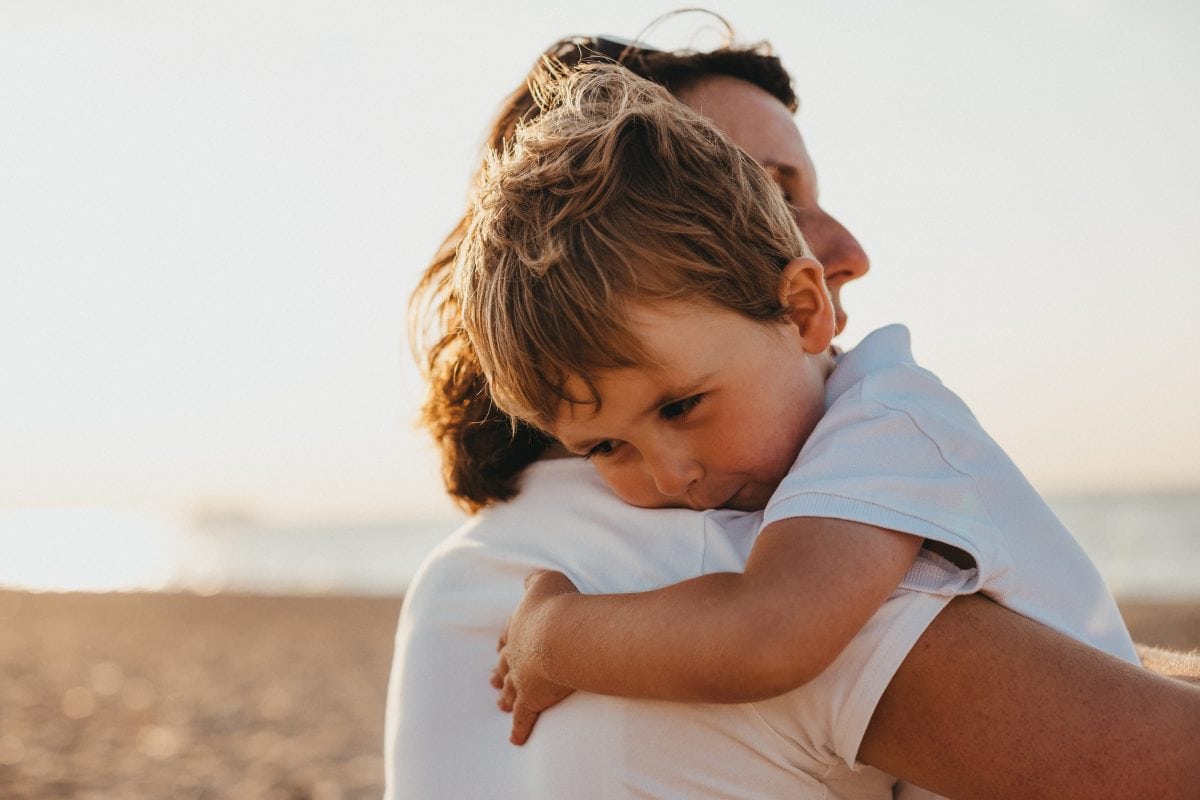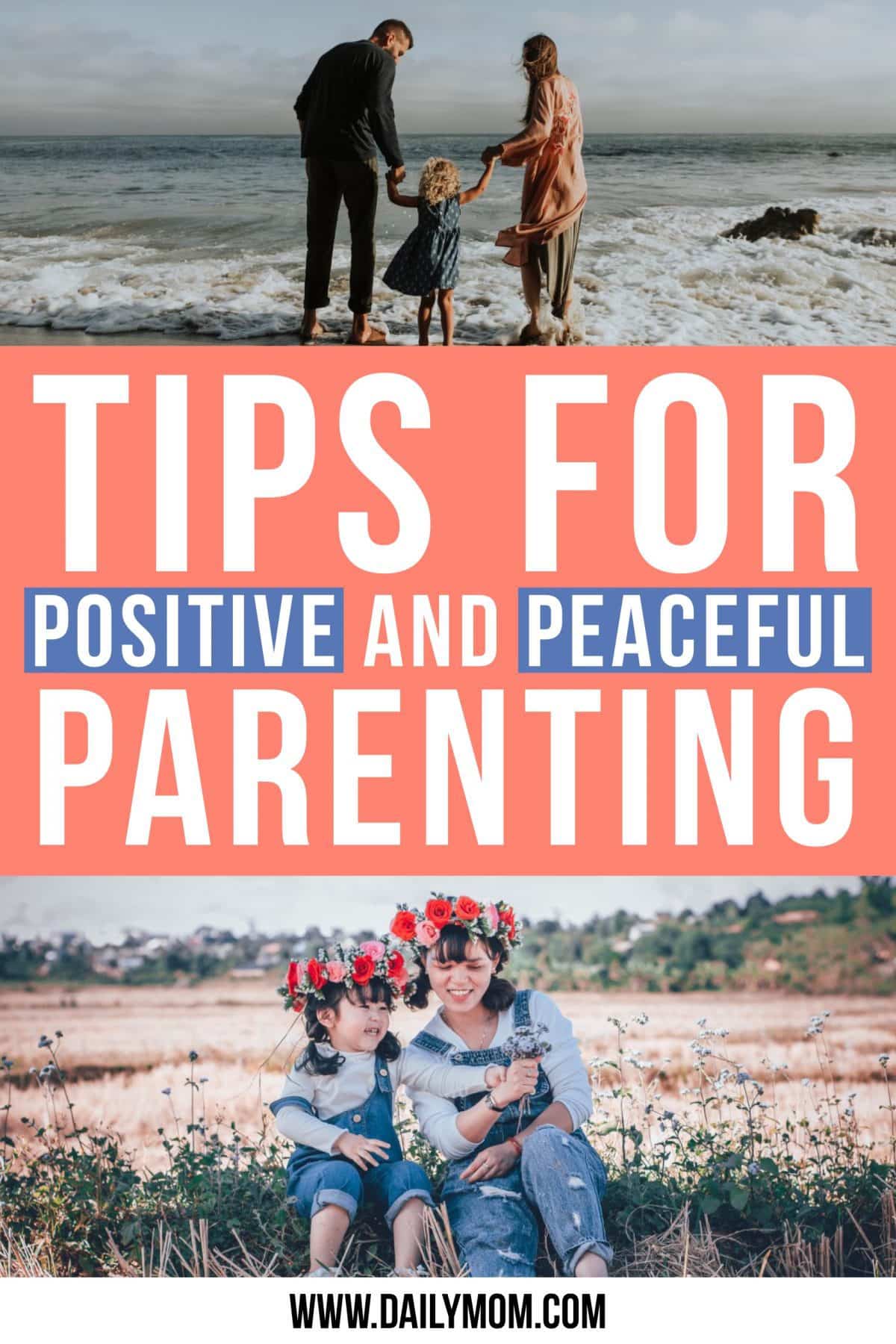Peaceful parenting takes time and practice. In general, parenting is not an easy task, yet it’s a full time job. No parent is perfect and each has their own approach when it comes to parenting. Positive and peaceful parenting is essential in order to minimize stress and frustration, and with time and persistence, any parent can achieve this. With some changes and a few bumps along the way, parenting can and will be easier and more enjoyable.
Often times, parents want to learn tips for a calmer and more effective approach to parenting. This is possibly due to feelings of guilt at times for how situations ended with their child. But guilting oneself is not healthy. Instead, changing one’s approach to parenting can make a significant difference and result in fewer feelings of guilt.

Start With Yourself for Peaceful Parenting
Everything always starts with the parent. When a parent feels stressed or upset about a situation, it’s best to stop and take a deep breathe in order to regulate their own emotions. Parent’s should not deal with situations while anger is flooding over them because this can cause unwanted reactions. It also could make the child look like the enemy when in truth, they aren’t. Delay taking action when in a heated moment and take the time to relax beforehand.
Focus on Connecting with the Child
Parents need ‘connection’ in order for peaceful parenting to work. Work on the bonding with the child. Take 15 minutes each day to connect. One-on-one is great! Give as much love as possible, as well as follow the child’s lead on conversation topics and the focus of the interaction. With this change and more connection, the child’s will likely respond to requests differently in the future.
Explain What is Happening
Once the connection is strengthened between the parent and child, the parent can more easily address conversation topics when something happens. The parent should calmly explain to the child that the rules are the same, but with less anger and yelling. Add in positive praises and displays of how much the child is loved, but that their behavior (or what they did wrong) was unacceptable. Parents should let them know and feel that they can always come to them for help when something is bothering them. When a child understands a parent’s communication, this alters their unwanted behavior usually in a positive manner.

Ask for Cooperation from the Child
Parents should explain to the child that they are going to work on getting less angry and not yelling, but they too have to cooperate on their end. The parent is the role model. So if the child sees more effort on the parents part, in turn they are likely to try as well.
Offer Support and Model Win-Win Situations
Children often get frustrated at certain events and don’t always handle things appropriately. For instance, if a child gets annoyed or upset by another sibling touching their things, a parent should explain to them how they understand their frustration and that it bothers them. The parent should help them find a safe place so that their things are ‘safe’ from anyone getting to them. This helps the child be less angry and not lash out. Helping the child and finding a solution together is a win-win for everyone involved.
Continue to Set Limits and Rules
When a parent sees the child’s side, they tend to become more flexible, but limits and rules should still be set. Set these BEFORE getting angry. This way, the situation can be handled more effectively while also empathizing with the child’s perspective. When limits and rules are set while the child’s perspective is acknowledged, it helps the child cooperate with the parent. For example, “I know you want to keep coloring. And I am sure when you grow up you will be an amazing artist, but right now, it is time for bed.” This type of approach helps the child cooperate and listen because their feelings are validated.

Teach Reparation
Think of this as repairing issues. Parents sometimes tend to always punish their children for repetitive behavior. Now it is time to REPAIR the behavior. After a certain situation occurs and everyone has had the time to calm down, the parent should take the child and have a discussion about what happened.
Be prepared to be patient, listen, and empathize with the child. Let the child open up and express all of their emotions before turning this into a teaching moment. When the child is done, then discuss their actions without lecturing, blaming or shaming, as well as try to see and understand their perspective. Ask the child how they can repair the damage (for example, spilled milk on the floor because they were acting wild). If the child continues to resist, this just means the child is looking for more HELP from the parent to heal them.
Expect Emotions
Children tend to hold onto their emotions because they are ‘afraid.’ Once a parent shows they care about how the child is feeling, their emotions can slowly be healed. Children act out due to their bottled up emotions as they do not know how to express them through words. A parent should train themselves to see the child’s behavior as a cry for help. Connect with the child and help them so that there is less anger and lashing out. The key is to help the child through their hurting and fears.
Create Safety
When a child shows the parent they are upset, the parent should stay calm and to not take it personally. The more a child sees compassion and acceptance from the parent, the more they will feel safe showing and expressing their emotions about certain situations. Anger is usually a response to feelings being threatened. Expressing feelings helps heal these emotions of anger. Try to be as compassionate as possible in order to create the feeling of safety. If the child doesn’t open up, it is a sign they need more empathy. It is all about TRUST.

Making Sense of the Situation
A parent should encourage the child make sense of the situation with a story. Allow the child to explain in their own words what happened and how they are feeling. Parents should remember to empathize, not analyze. Letting the child talk and share their feelings helps them feel heard and understood – not invalidated or lectured. Children benefit from using words as it helps them understand their emotional life.
Model Apologies
When forcing a child to apologize, this could lead to resentment. A parent should therefore model apologies and slowly the child will follow their example. If and when something goes wrong, a parent should aim to take as much responsibility as they possibly can so they can model the apology and show that they take responsibility. The more the child sees this, the more they will learn to apologize and take responsibility as well. It becomes second nature. Whatever the situation, a parent should also explain to the child how they feel without blaming or shaming. This allows the child to understand how they were involved, but without making them feel bad.
Expect Setbacks
Everyone is human and no one is perfect. Expect hard days, parenting is not easy! But with time, it will get simpler and more rewarding. Parents should remember that they are working on helping the child heal both the parent and the child’s wounds. In the end, there is less drama and more love.
Positive and peaceful parenting is achievable by anyone. With the cooperation of both the parent and child, things will become more easy and enjoyable. Follow these simple and easy approaches and parenting will become a breeze!
WANT TO READ MORE?
Check out this article on PARENTING 101: FACTS ABOUT NATURE VS. NURTURE

Sources: 15 Positive Parenting Techniques Every Parent Should Know
13 Tips to Transition to Peaceful Parenting








































